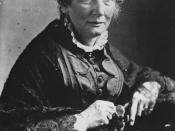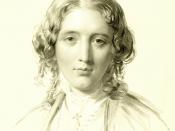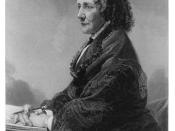It is well known that western literature is based on two pillars--the Greek
culture and the Hebrew culture. In the Hebrew culture, there is a book,
namely, the Bible that accumulates its rich cultural heritage. Most western
authors are influenced by those two literary origins consciously or unconsciously.
They, without doubt, also influenced Harriet Beecher Stowe (1811-1896),
a nineteenth century American female writer. Yet, with her strong religious
background, she tended to be influenced deeper by the latter than by the
former. Born into a family of religion, Harriet's father, Lyman Beecher
was one of America's most celebrated clergymen and the principal spokesman
for Calvinism in the nineteenth century; her mother, was a woman of prayer
who died when Harriet was four years old; her brother, Henry Ward Beecher,
was the best known pulpit orator of his times. In 1836, she was married
to Calvin Stowe, a Biblical scholar. In a word, Harriet Beecher Stowe was
bred, and lived all her life at the atmosphere of Christianity that inevitably
influenced her masterpiece Uncle Tom's Cabin.
It's commonly agreed that Uncle Tom's Cabin is an anti-slavery novel.
In fact, it is for the cause of abolitionism that Mrs. Stowe took up her
pen. Yet, anti-slavery spirit is not contradictory or incompatible with
spirit of Christianity. In fact, they co-exist quite harmoniously in Uncle
Tom's Cabin. Feminism is also quite evident in this book. Many articles
have been written to discuss the anti-slavery spirit or feminism in it.
However, this thesis will mainly focus on Christianity in Uncle Tom's Cabin.
I. Northrop Frye's Theory of Archetype
In Greek, 'arch' means 'first', 'typos' means 'form' or 'type'. So, 'archetype'
means first type/form or original type/form. In the theories of Swiss psychologist
Carl Gustav Jung (1875-1961), archetypes are primordial mythic forms that...


